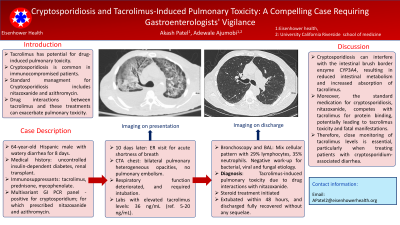Monday Poster Session
Category: Small Intestine
P2706 - Cryptosporidiosis and Tacrolimus-Induced Pulmonary Toxicity: A Compelling Case Requiring Gastroenterologists' Vigilance
Monday, October 23, 2023
10:30 AM - 4:15 PM PT
Location: Exhibit Hall

Has Audio
- AP
Akash Patel, MD
Eisenhower Health
Rancho Mirage, CA
Presenting Author(s)
Akash Patel, MD1, Adewale Ajumobi, MD, MBA, FACG2
1Eisenhower Health, Rancho Mirage, CA; 2Eisenhower Health, University of California, Rancho Mirage, CA
Introduction: Cryptosporidiosis can affect immunocompromised individuals, especially transplant patients. Tacrolimus, an immunosuppressive agent utilized in transplant patients has the potential to cause pulmonary toxicity in the form of interstitial pneumonitis. The standard treatment for cryptosporidiosis involves the use of nitazoxanide and azithromycin. However, the interaction between these drugs and tacrolimus can also contribute to the development of drug induced pulmonary toxicity.
Case Description/Methods: A 64-year-old Hispanic male presented to the gastroenterology clinic with watery diarrhea for eight days. He has a history of uncontrolled insulin-dependent diabetes mellitus, deceased donor renal transplant and on immunosuppressive regimen of tacrolimus, prednisone, and mycophenolate. A multivalent gastrointestinal (GI) panel with PCR was positive for cryptosporidium, for which he was prescribed nitazoxanide and azithromycin.
Ten days after the clinic visit, the patient developed acute onset shortness of breath and presented to the emergency room. A computed tomography (CT) scan showed bilateral heterogeneous opacities, especially in the right upper lung. He did not have pulmonary embolism. His respiratory function deteriorated, and he required intubation. His serum tacrolimus levels were found to be significantly elevated to 36 (reference range 5-20 ng/mL). He underwent bronchoscopy and bronchoalveolar lavage (BAL), showing mixed cellular pattern with lymphocytic (29%) and neutrophilic (35%) predominance. Other investigations for bacterial, viral and fungal etiologies were normal. He was diagnosed with dose-dependent pulmonary toxicity of tacrolimus in setting of cryptosporidiosis and drug interaction with nitazoxanide. He was started on steroids and within 48 hours he was successfully extubated. He was discharged with complete recovery and without any sequelae.
Discussion: Gastroenterologists must exercise caution when treating patients with cryptosporidium-associated diarrhea due to potential drug interactions. Cryptosporidiosis can interfere with the intestinal brush border enzyme CYP3A4, resulting in reduced intestinal metabolism and increased absorption of tacrolimus. Moreover, the standard medication for cryptosporidiosis, nitazoxanide, competes with tacrolimus for protein binding, potentially leading to tacrolimus toxicity and fatal manifestations. Therefore, close monitoring of tacrolimus levels is essential, particularly when treating patients with cryptosporidium-associated diarrhea.
Disclosures:
Akash Patel, MD1, Adewale Ajumobi, MD, MBA, FACG2. P2706 - Cryptosporidiosis and Tacrolimus-Induced Pulmonary Toxicity: A Compelling Case Requiring Gastroenterologists' Vigilance, ACG 2023 Annual Scientific Meeting Abstracts. Vancouver, BC, Canada: American College of Gastroenterology.
1Eisenhower Health, Rancho Mirage, CA; 2Eisenhower Health, University of California, Rancho Mirage, CA
Introduction: Cryptosporidiosis can affect immunocompromised individuals, especially transplant patients. Tacrolimus, an immunosuppressive agent utilized in transplant patients has the potential to cause pulmonary toxicity in the form of interstitial pneumonitis. The standard treatment for cryptosporidiosis involves the use of nitazoxanide and azithromycin. However, the interaction between these drugs and tacrolimus can also contribute to the development of drug induced pulmonary toxicity.
Case Description/Methods: A 64-year-old Hispanic male presented to the gastroenterology clinic with watery diarrhea for eight days. He has a history of uncontrolled insulin-dependent diabetes mellitus, deceased donor renal transplant and on immunosuppressive regimen of tacrolimus, prednisone, and mycophenolate. A multivalent gastrointestinal (GI) panel with PCR was positive for cryptosporidium, for which he was prescribed nitazoxanide and azithromycin.
Ten days after the clinic visit, the patient developed acute onset shortness of breath and presented to the emergency room. A computed tomography (CT) scan showed bilateral heterogeneous opacities, especially in the right upper lung. He did not have pulmonary embolism. His respiratory function deteriorated, and he required intubation. His serum tacrolimus levels were found to be significantly elevated to 36 (reference range 5-20 ng/mL). He underwent bronchoscopy and bronchoalveolar lavage (BAL), showing mixed cellular pattern with lymphocytic (29%) and neutrophilic (35%) predominance. Other investigations for bacterial, viral and fungal etiologies were normal. He was diagnosed with dose-dependent pulmonary toxicity of tacrolimus in setting of cryptosporidiosis and drug interaction with nitazoxanide. He was started on steroids and within 48 hours he was successfully extubated. He was discharged with complete recovery and without any sequelae.
Discussion: Gastroenterologists must exercise caution when treating patients with cryptosporidium-associated diarrhea due to potential drug interactions. Cryptosporidiosis can interfere with the intestinal brush border enzyme CYP3A4, resulting in reduced intestinal metabolism and increased absorption of tacrolimus. Moreover, the standard medication for cryptosporidiosis, nitazoxanide, competes with tacrolimus for protein binding, potentially leading to tacrolimus toxicity and fatal manifestations. Therefore, close monitoring of tacrolimus levels is essential, particularly when treating patients with cryptosporidium-associated diarrhea.
Disclosures:
Akash Patel indicated no relevant financial relationships.
Adewale Ajumobi indicated no relevant financial relationships.
Akash Patel, MD1, Adewale Ajumobi, MD, MBA, FACG2. P2706 - Cryptosporidiosis and Tacrolimus-Induced Pulmonary Toxicity: A Compelling Case Requiring Gastroenterologists' Vigilance, ACG 2023 Annual Scientific Meeting Abstracts. Vancouver, BC, Canada: American College of Gastroenterology.
